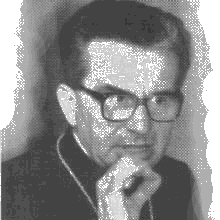Directions about the distribution of the Eucharist
Decree of 27 April 2009
Since the times of its very origins, the apostolic Church has expressed its own faith persuasion that the disciples meet with the risen Christ, experience him in the first day after Saturday listening to the Word of God and its explanation and breaking the Eucharistic bread (see also Le 24, 13-35; Al 20, 7-12). Saint Justin, in his I Apologia, in #67, testifies the further development of this usual procedure.
The preaching of the Apostles, then, illustrated to the faithful the greatness of the Sacrament of the altar and the necessary mood that is necessary to take profitably part in it, without risking to eat and drink one’s own eternal condemnation (see 1 Cor 11, 29), but on the contrary so that eating that bread, Body of Christ given for the life of the world, the ones who believe can have eternal life (see John 6, 51).
Therefore, it is precise duty of the apostle [i.e.: the bishops as apostolic successors] to often exhort the Christians so that they can worthily receive the Body of Christ, shaping their own lives on the image of the One who is received in the Sacrament.
The devotion and the interior veneration with which the faithful approach the Eucharist is revealed also externally in the way they receive the consecrated Bread.
The shepherds’ catechesis must never miss to linger over the way the Eucharist can be approached in order to avoid as much as possible that the Most Holy Sacrament of Eucharist be treated with superficiality or even in a disrespectful way, or even worse, sacrilegious.
We must in fact realize that unfortunately many cases of profanation of the Eucharist have occurred, profiting by the possibility to receive the consecrated Bread on one’s palm of the hand, mostly, but not only, during big celebrations or in big churches attended by a great number of occasional faithful.
For such reason, it is necessary to make sure that, at the moment of the Holy Communion, people observe the common rules that are well known to everybody.
The distribution of the Eucharist be done in a quiet and orderly way, be done first of all by the ordered ministers (priest and deacon); only in their absence, by ministers established with this very goal (acolyte). Only in really exceptional cases make use of other established ministers (lector), of nuns or of well prepared laymen.
During the Holy Communion the servers shall assist the Minister, as far as possible, in watching that every faithful, after receiving the consecrated Bread, consumes it immediately in front of the minister, and that it must for any reason be taken back to the seat, or put into pockets or bags or elsewhere, or that It fall to the ground and be trampled on.
The Eucharist, in fact, is the most precious gift that the Church preserves, alive presence of Our Risen Lord; all the faithful must feel called to make any possible effort so that this presence be honoured first of all with our life and, then, with the external signs of our worship.
Anyway, considering the frequency in which cases of irreverent behavior in the act of receiving the Eucharist have been reported, we dispose that starting from today in the Metropolitan Church of S. Peter, in the Basilica of S. Petronius and in the Shrine of the Holy Virgin of S. Luke in Bologna the faithful are to receive the consecrated Bread only from the hands of the Minister directly on the tongue.
In addition, we recommend all the priests to remind their people of the necessity to be in the grace of God in order to be allowed to receive the Eucharist and of the great respect that is due to the Sacrament of the Altar: through their catechesis, preaching, keen and loving celebration of the Holy Mysteries, educating the faithful to worship the God who made himself a man with their own lives and with the participation, that requires the highest care, even in gestures, of the Lord’s table.
We finally exhort the faithful to make any effort in order that the Eucharist, spring and top of all Christian life, be more loved and worshipped, recognizing in It the presence itself of the Son of God among us.
Bologna, from the Archbishop Residence, 27 April 2009.
+ Cardinal Carlo Caffarra
Archbishop
La traduzione, non rivista dal Cardinale Caffarra, è redazionale.
| 

 english version
english version 


